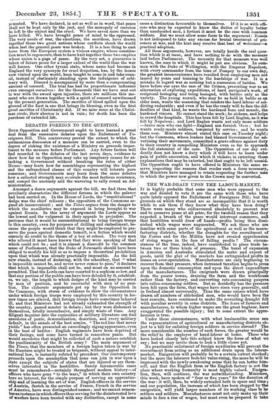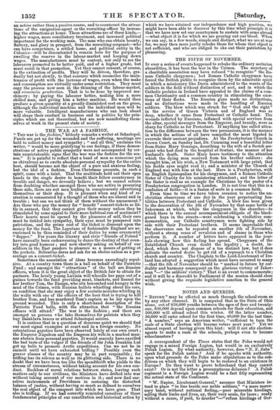THE WAR-DRAIN UPON THE LABOUR-MARKET.
IT is highly probable that some men who were opposed to the war and desired to veto it are the same with those who have quite lately opposed the Enlistment of Foreigners Bill ; but the grounds on which they stand are so incompatible that it is worth while to ask them if they know. what they have been doing? There were many who endeavoured absolutely to prevent war and to preserve peace at all price, for the twofold reason that they expected a breach of the peace would interrupt commerce, and that hostilities would draw off hands—profits being thus dimi- nished while wages were augmented. We ask those who are familiar with some parts of the agricultural as well as the manu- facturing districts, whether the draughts for the recruitment of the Forces and for the Militia have not created apprehension of rising wages in the face of falling profits ? The circum- stances of the time, indeed, have contributed to place trade be- tween two or three kinds of pressure. The burst of expansion in America and Australia stimulated the make and export of goods, until the glut of the markets has extinguished profits in losses on over-speculation. Manufacturers are only beginning to recover from that pressure, when increased taxation begins to press upon the domestic consumption and upon the direct expenditure of the manufacturers. The emigrants were drawn principally from the poorer towns, draining the farm and the workhouse rather than the factory, and converting rate-consuming paupers into calico-consuming settlers. But so decidedly has the pressure been felt upon the farm, that wages have risen very generally, and in Ireland almost universally. Thus the same causes which have drawn off numbers of ablebodied men, who would have been the best recruits, have continued to make the recruiting draught felt with peculiar severity in some districts. The fears of farmers and manufacturers, to whom higher wages are the great bugbear, have exaggerated the possible injury ; but to some extent the appre- hension is true.
Under these circumstances, with what businesslike sense can the representatives of agricultural or manufacturing districts ob. ject to a bill for enlisting foreign soldiers in service abroad? The more considerable the number of such forces, the greater would be the relief to the employer of hand-labour at home. Those 'who have looked closely into this subject know the force of what we say ; but we may invite them to look a little closer yet. No practicable enlistment of foreign auxiliaries will prevent the recruitment from acting as an additional drain upon the labour- market. Emigration will probably be to a certain extent checked; but the more the labourer feels his value rising, the more he will be impressed with the newly-awakening sense that he can better him- self, and that the English farm or the English factory is not the place where working humanity is most highly valued. Emigra- tion, then, will continue, the war notwithstanding. Ministers, this week, have spoken of "four or five years" for the duration of the war: it will, then, be widely extended both in space and time; and our population, the increase of which has been stopped by the emigration, will yield larger numbers of its working class to be settlers and soldiers. Manufacturers must not only make up their minds to face a rise of -wages, but must even be prepared to take
an active rather than a passive course, and to counteract the attrac- tions of the emigration-agent or the recruiting-officer by increas- ing the attractions at home. These attractions are of three kinds,— higher wages, more conciliatory treatment, and increased political importance for the working man. The man who can obtain bounty, flattery, and glory in prospect, from the recruiting-sergeant—who can have competence, a settled home, and political entity in the Colonies—will be discontented to remain here for the purpose of swelling the reserve in the labour-market and keeping down wages. The manufacturers must be content, not only to see the labourers promoted to be better paid, and of a higher grade, but must assist in that promotion. Yet they cannot consent, of course, to the extinction of profits. They will be driven, therefore, gra- dually but not slowly, to that resource which reconciles the main- tenance of profit with the increase of wages, even when the make and consumption are virtually under some restriction. They must copy the process now seen in the thinning of the labour-market, and economize production. That is to be done by improved ma- chinery; by paying the labourer better, making him a more skilled man, and giving him a better machine. He would then produce a given quantity at a greatly diminished cost on the gross, although the individual machine and the individual man will be more valuable. Intelligent manufacturers who can look ahead will shape their conduct in business and in politics by the prin- ciples which are not theoretical, but are now manifesting them- selves at work in the present state of society.



































 Previous page
Previous page